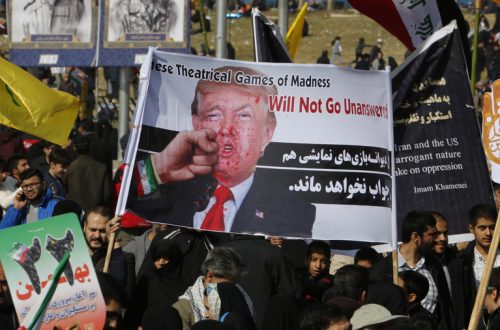This is a guest post by Ben Cohen of Z Word
Did Richard Holbrooke, the US Envoy to Afghanistan and Pakistan, meet the Iranian Deputy Foreign Minister, Mohammad Mehdi Akhoondzadeh, on the sidelines of a major international conference on Afghanistan? Holbrooke says he did. The Iranians say he didn’t.
Not surprisingly, more information about what apparently happened has come from the US side. Secretary of State Hillary Clinton went out of her way to highlight the encounter, describing it as “cordial and unplanned…they agreed to stay in touch.” At the same time, Clinton identified the mutual interest which the US shares with Iran when it comes to combating the heroin trade emanating from Afghanistan. But the Iranians did not respond in kind, issuing a curt denial of both the chat with Holbrooke and the handing over of a letter requesting assistance with the plight of three Americans in Iran, including the journalist Roxana Saberi, currently languishing in the dungeons of Evin prison. Put more starkly, they are accusing Holbrooke and Clinton of lying.
Some commentators – particularly those who portray the Obama Administrations’ overtures to Iran as naiveté bordering on appeasement – will doubtless crow over this latest rebuff, just as they did over the frosty response to Obama’s Nowrouz video message. But that misses the point. The Administration is not looking for a kumbaya moment with Iran. It is trying to establish whether meaningful engagement with Iran is possible, and it is doing so because Iran represents a threat to the US. Holbrooke, after all, is a founder of the group United Against Nuclear Iran.
This is an important point, at least for anyone not in thrall to the notion that only Israel wants to prevent the Iranian regime from weaponizing its nuclear program. Which is why today’s testimony to Congress from General David Petraeus, the head of Central Command, is arguably more interesting reading than was Benyamin Netanyahu’s interview with Jeffrey Goldberg.
Said Petraeus: “The Israeli government may ultimately see itself so threatened by the prospect of an Iranian nuclear weapon that it would take preemptive military action to derail or delay it.” More significant is what he didn’t say: that the US would try to prevent Israel from taking such action. Moreover, going by what Petraeus said on Fox News yesterday (“But are they a threat? Certainly. They have armed, equipped, funded surrogates – proxies, if you will – extremist proxies, in Lebanon, in Gaza Strip, varying degrees in Iraq”), subsequently echoed in his Congressional testimony, it’s clear that the top US military commander in the Middle East has either succumbed to some very intense lobbying from Israel advocates or has made up his own mind that Iran’s nuclear program isn’t for civilian purposes alone.
Netanyahu did not, when speaking to Goldberg, specify when he believed Iran’s nuclear program would pass the point of no return, although other Israeli officials have spoken in terms of months rather than years. In his Fox interview, Petraeus used the phrase “some years,” but confessed to not knowing how many. Now, one can argue that there is a political calculation here, insofar as uncertainty feeds the sense of a shadowy threat drawing ever nearer. But the Iranians could banish all that by cooperating with the IAEA’s demand for transparency, so as to allay, in the words of its most recent report, “concerns about possible military dimensions of Iran’s nuclear program.”
Barely visible in all of this are the other partners to this drama: those Arab states, particularly in the Gulf, terrified by the prospect of a nuclear Iran. The Kuwait Times recently reported that a prominent local pundit, Abdullah al-Hadlaq, was urging a complete diplomatic break with Iran, since it has become blindingly obvious that the mullahs will not be diverted from their pursuit of nuclear weapons. In a wider survey of regional opinion, Amir Taheri found Egypt’s President and Saudi Arabia’s clerics using increasingly bellicose language about Iran, underlining the inevitable proliferation which Iran’s program has spawned.
Back, then, to the Obama Administration and its Iran diplomacy. In Abu Dhabi’s newspaperThe National, Emile Hokayem writes that “two philosophies and two camps are emerging: those who want to build confidence on issues of shared concern and lock Tehran into a virtuous dialogue before moving on to serious diplomacy on the nuclear challenge, and those who argue that the nuclear clock is ticking so fast that immediate outreach to Tehran – with sweeter carrots and bigger sticks – is essential. The signs are that Mr Obama’s policy will borrow from each.” That seems to me to be a sensible summation, although it suggests that progress is exclusively dependent upon what Washington does. The Iranian regime has many dubious qualities, but passivity isn’t one of them.
Back in 1951, Senator Robert Taft observed that “History shows…arbitrary rulers are more inclined to favor war than are the people at any time.” In dealing with Iran’s rulers, that insight is worth bearing in mind – and counts for much more than an April Fool’s Day exchange about whether a handshake took place.


